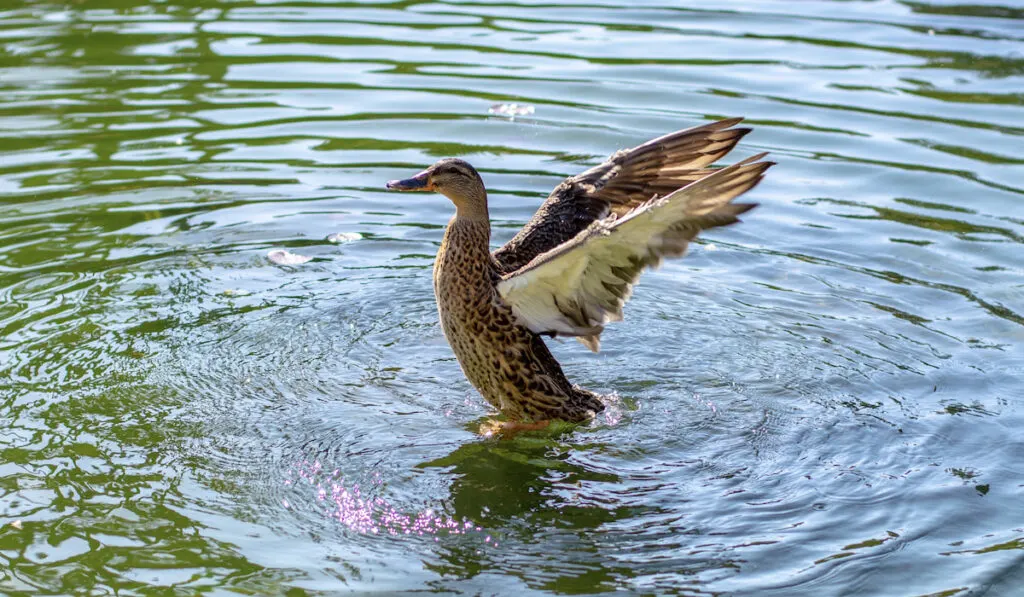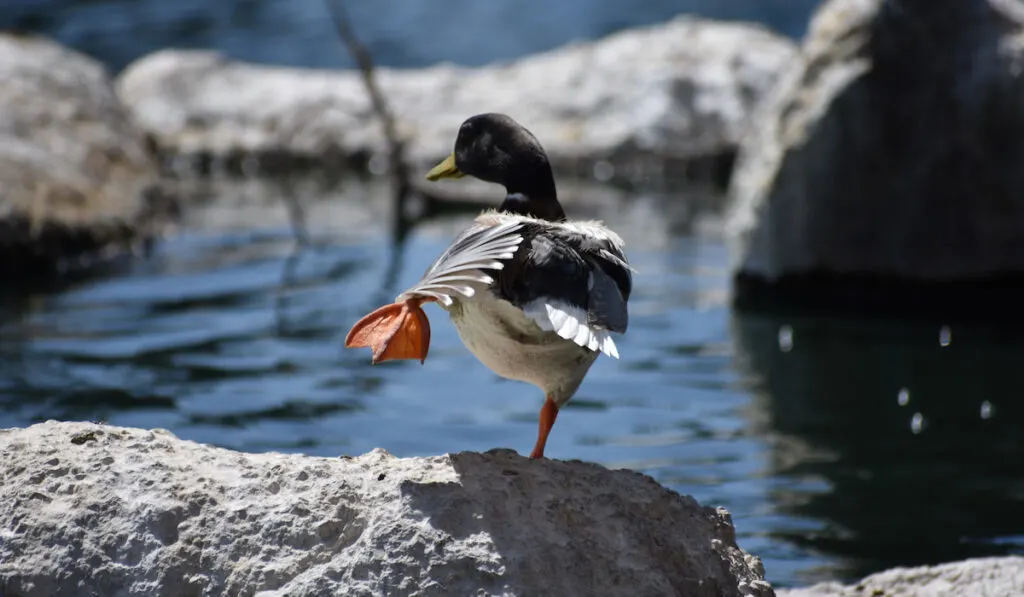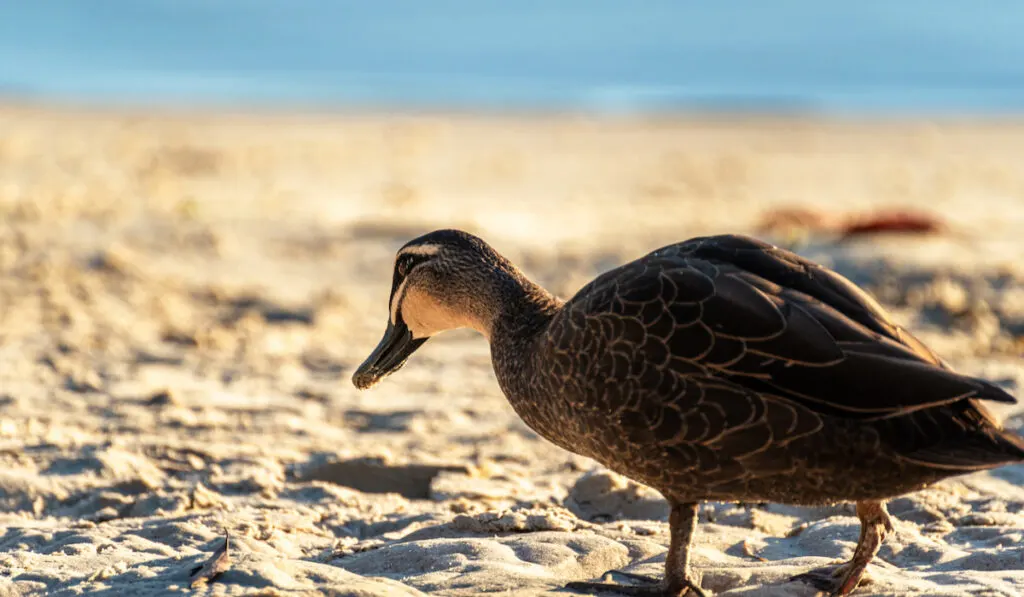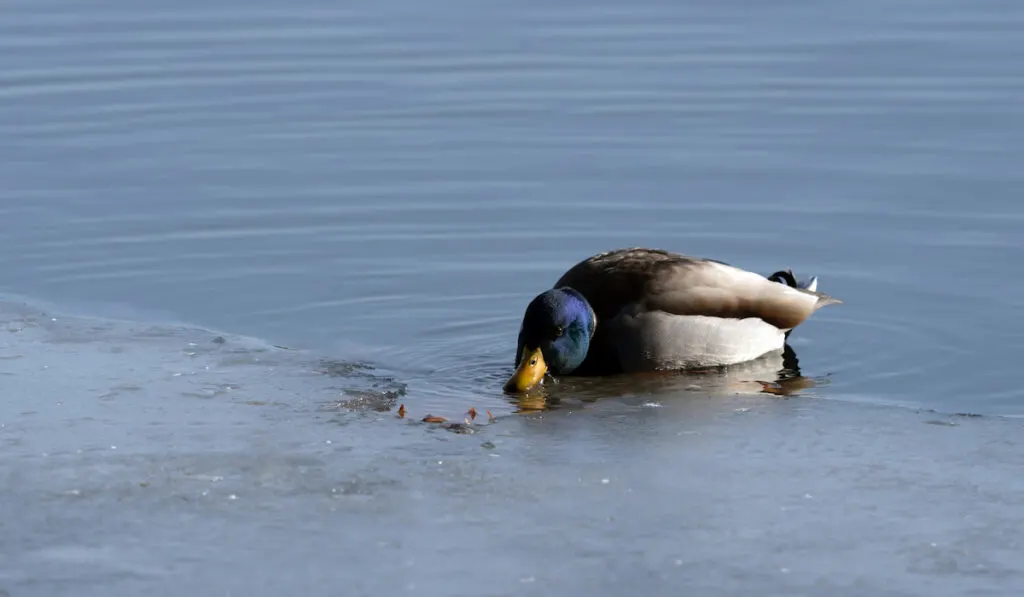Why do you think your ducks shake parts of their bodies like tails, wings, and head? Most people probably don’t think anything of it. However, it would interest you to know that there are various reasons that are responsible for a duck’s behavior.
It is imperative as a duck owner to know what these behaviors stand for and take actions if necessary.
This guide explains why ducks behave in certain ways, and will help you decide should be worried or not about their behavior.

Table of Contents
Why Do Ducks Shake Their Heads, Tails, and Wings?
1. Mating Behavior
When a male duck vigorously shakes its wings and tails, it might look like something serious is wrong. However, if you look closely, you will notice that there is probably a female duck around. The shaking of tails and wings by male ducks often signifies that they are trying to get the female duck’s attention.
This action is one of the ways ducks flirt with one another. The male duck, drake, shakes its tail and head to attract the female duck, the hen. If the hen accepts the drake’s proposal, it responds affirmatively by nodding its head.
The drake also uses his wings and head to splash water on the hen to get her attention. And he uses his wings and neck to swim in a circle round the hen to show his interest.
2. Illness
Another primary reason why ducks shake their wings is when an illness is in play. If you observe that your duck is shaking its wings and tails during warm weather, it is likely that it has been infected with some sort of illness. You need to take immediate actions by isolating it from other ducks and informing your veterinarian.
Before the veterinarian comes over, you can examine the duck yourself by checking the preen gland positioned close to its tail. If this gland is colored-yellow or it is swollen, it could be suffering from wet feathers. It is vital that you inform your veterinarian about this observation.
Also, it would be great to bathe the duck and dry it adequately. The bath you use to bathe the duck should be warm, and its wings should be cleaned with mild soap or detergent. It is important to dry the duck properly to eliminate excess dirt and oil from its feathers and wings.
During this period, ensure the duck does not stay in the water for an extended period. If it must swim, it should only be for short periods, and it must be dried properly immediately.

3. Excitement
It is very easy to know if a duck is excited. If it wags its tail, flaps its wings, and hops from one point to another, it implies it is very excited.
The way a duck wags its tail is similar to a dog when it is excited. Just like dogs, domestic ducks wag their tails when they see their owners. Similarly, a duck nods its head and tilts from side to side if it is very excited.
4. Search for predators or food
When a duck shakes its head from one side to another with a strange stare on its face, it doesn’t imply anger. Usually when this happens, it implies the duck is searching the area for food or predators. Hence, they will tilt their head to get a profound visual perspective of the area.
Three Common Health Problems that Cause Shivering in Ducks
Normally, shivering in ducks is caused by low temperatures that are typical in extreme weather conditions. However, when a duck is shivering, there is also a big chance that the duck is suffering from bacterial or viral infections.
Below are some usual health problems that would make a duck shiver

1. Duck Pneumonia
Duck Pneumonia is also called Aspergillosis, and this infection surfaces when the duck breathes in fungus spores. These spores are also called Aspergillus fumigatus.
When the duck inhales the fungus spores, they enter into the air sacs and cause plaque formation. The duck begins to shiver and manifest other symptoms like dehydration, appetite loss, isolation, and fatigue.
Fungus spores are usually formed on moldy feed and beddings. When their housing and feeding materials remain wet, it is more likely for spore formation to occur.
If the duck is already suffering from another infection, there is an increased chance of being infected with Duck Pneumonia. When you discover that your ducks have a weakened immune system, it is best to care for them to prevent additional infections.
2. Duck Viral Hepatitis
Duck Viral Hepatitis is an infection that affects the liver of ducks. The major feature is enlarged liver or hepatomegaly, and it is a very contagious illness whose symptoms occur early.
In addition to shivering, which your duck will typically manifest, it would also experience diarrhea, loss of appetite, and tremors.
Duck Viral Hepatitis is fatal as it can kill within a few hours. Hence, it is imperative to reach out to a veterinarian once you suspect it.

3. Newcastle Disease
Like Duck Viral Hepatitis, Newcastle disease is a viral illness that affects ducks’ respiratory system. It also adversely affects the nervous system. Ducks shiver severely when they are hit with Newcastle Disease, and they exhibit other symptoms like tremors, depression, and paralysis.
You can prevent this infection in your ducks when you suspect it by giving them vaccines.
Shaking and Shivering: What’s the Difference?
When your duck shivers, it might be challenging to discover the exact problem. It could be merely due to wet feathers or a chronic infection. You can check this article for additional information. However, if your duck is shaking regularly and viciously, it is crucial to isolate the duck from the flock and call a veterinarian.
Conclusion
Both on land and water, ducks, are exciting creatures to watch. And if you own them, it is important to know and understand their behaviors and causes for those behaviors, both good and bad. This will help you forestall serious health problems if you catch them early enough.
If you suspect any health problem in your duck, it is vital to reach out to your veterinarian for help.

Berlynn Stremel
Friday 23rd of December 2022
My duck shivers but not very noticeable, you have to stop and watch to catch that she is in fact shivering. I read about the fungus that can form from wet bedding, i’ll admit there has been spilling of water because I had to swap bowls in and out due to the below freezing temp. I change out their bedding as much as I can, although where the water was spilt it is as hard as a rock. I have a water heater now fyi, so water isn’t spilt anymore. I live where winters are harsh like today was -28 and I don’t want my duck to die. I gave her a bath today and made sure she was dry, she wasn’t shivering then. Do you think it’s just the cold weather or something completely different?